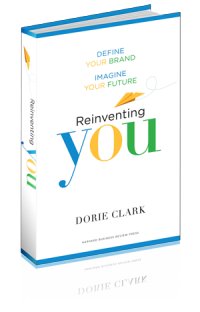ATD Blog
A Q&A with Dorie Clark: Defining Your Brand
Fri Jan 31 2014

Dorie Clark is a marketing strategy consultant and recognized branding expert who has worked with a diverse range of clients, including Google, the Ford Foundation, the Mount Sinai Medical Center, and Yale University. She is a frequent contributor to Harvard Business Review and Forbes.
I was fortunate enough to catch up with Dorie to discuss her book on personal branding in today’s workplace.
In Reinventing You****, you write, “To survive and thrive, you have to reinvent yourself and move on.” But not everyone has a crystal clear vision. What are some of the more subtle signs that it’s time for you to reinvent yourself and move on?
In order to ensure your continued professional growth, it’s important to recognize when your routine at work has actually become a rut. Every six to 12 months, take a step back and ask:
What new skill have you learned or refined in the past year?
Do you feel that your boss and colleagues recognize and tap your full potential?
Are you being offered “stretch” assignments?
Do you enjoy going to work every day, or at least most days?
If not, it may be time to reinvent yourself.
What are your favorite questions and strategies for generating a clear understanding what your reputation with others really is?
One easy way to get a sense of how you’re viewed by others is to ask four to six people who know you fairly well, “If you only had three words to describe me, what would they be?” That can often give you a quick sense of what others see as your most defining characteristics.
Another strategy is to Google yourself, and review the links that come up as though you were a stranger. If you didn’t know anything about this person, what would you surmise about them? That can be eye-opening.
You address the importance of test-driving your path and having an immersive experience of the future you’ve selected to move toward. How might that work for someone who must hold down a traditional job while reinventing and propelling themselves in new directions?
When you’re making a career transition, it’s important to plan carefully. You don’t want to quit your job and jump into something new, only to discover you actually hate it. Most people underestimate the amount of solid research they can conduct while holding down a full-time job.
Volunteering to serve on a nonprofit board is a fantastic way to learn new skills in a low-risk environment. If you want to master social media, or fundraising, or creating budgets, they’ll almost always let you dive in. Additionally, you can take a few days off and “job shadow” someone to get a sense of their day-to-day experience. You can organize this on your own (most people will probably say yes) or pay a service like Pivot Planet to help you find an opportunity.
You mention that mentors “often come in unexpected packages.” What’s the most unexpected package in which you’ve found excellent mentorship?
When I worked as the New Hampshire communications director on a presidential campaign, it was a fast-paced, high-pressure job. I was supervising a team of a dozen in the press office, and one day, my assistant, Kumar, asked a powerful question: What can I do to make your job easier?
I was instantly grateful, and realized he’d captured the essence of being a good employee: If you can help your boss with what matters most to them, they will be in your debt. I didn’t figure that out on my own; it took Kumar to show me, and it’s made me a better professional ever since.
What’s the first thing you hope readers will do with the information they learn in Reinventing You?
I hope readers will be inspired to start thinking and talking about what they want to be known for by others. Too often, people shy away from any conversations about “personal branding” because they fear they’ll seem too cunning or manipulative.
I think it’s essential for every professional to really grapple with their reputation. They should try to address the questions: Are you coming across the way you’d like to be seen by others? If not, why? What steps can you take to close the gap?
If you want to make a difference in the world, you need others to understand who you are and what you’re capable of—and it starts with an honest conversation.
You've Reached ATD Member-only Content
Become an ATD member to continue
Already a member?Sign In
